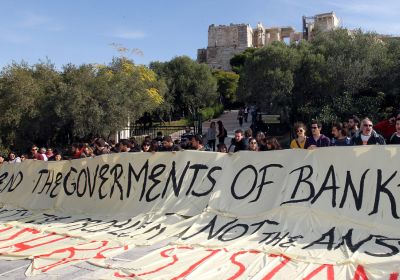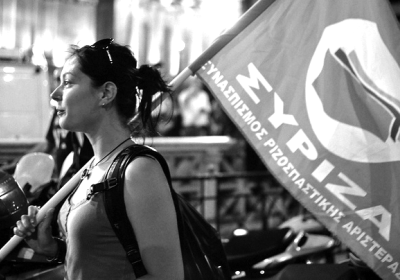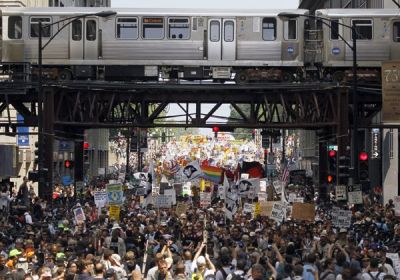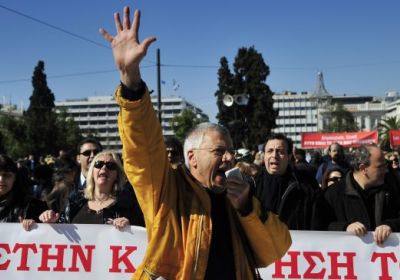
-
 “If the Greeks had done the right thing, they wouldn’t be in the mess they’re in today.” The argument that the Greek people brought austerity packages down on their own necks keeps getting louder.
“If the Greeks had done the right thing, they wouldn’t be in the mess they’re in today.” The argument that the Greek people brought austerity packages down on their own necks keeps getting louder. -
 Mariano Rajoy, the Popular Party Spanish prime minister of Spain, appeared at a special press conference on June 9 to give the nation the good news—Spain had won the lottery! A €100 billion prize in the European Bank Rescue Lotto! Make no mistake, señoras y señores, this was not a “bailout package” or a “rescue” of the kind inflicted on Greece, Ireland and Portugal, full of those nasty “macroeconomic conditionalities” imposed by the “troika” of the European Union, European Central Bank and International Monetary Fund..
Mariano Rajoy, the Popular Party Spanish prime minister of Spain, appeared at a special press conference on June 9 to give the nation the good news—Spain had won the lottery! A €100 billion prize in the European Bank Rescue Lotto! Make no mistake, señoras y señores, this was not a “bailout package” or a “rescue” of the kind inflicted on Greece, Ireland and Portugal, full of those nasty “macroeconomic conditionalities” imposed by the “troika” of the European Union, European Central Bank and International Monetary Fund.. -
In the June 17 elections, anti-austerity Coalition of the Radical Left (SYRIZA) came a close second with 26.9% of the vote. The right-wing New Democracy came first with more than 29%, amid huge blackmail and threats from major governments and financial institutions, and will now attempt to form a coalition government.
-
“Nearly three years into their country's worst crisis in modern times, life goes on as normal for Greece's super-rich,” The Guardian said on June 13. The article said that, “since the outbreak of Greece's runaway debt crisis, its moneyed class has been notable more by its absence than presence”.
-

On the eve of the June 17, 2012 elections in Greece, Green Left correspondent Afrodity Giannakis reports from Thessalonika, on the hopes and fears of a people being forced to bear the burden for a global capitalist economic crisis built on the greed, speculation and corruption of the rich and powerful minority.
-

In the June 17 elections, anti-austerity Coalition of the Radical Left (SYRIZA) came a close second with 26.9% of the vote.
-
 Greece's Coalition of the Radical Left (SYRIZA) dramatically increased its vote in Greece's May 6 elections, to take second place on a clear platform of rejecting the savage austerity measures that seek to make Greek people pay for the capitalist crisis. Some polls show SYRIZA a clear first in the new June 17 elections, called after no party was able to form government.
Greece's Coalition of the Radical Left (SYRIZA) dramatically increased its vote in Greece's May 6 elections, to take second place on a clear platform of rejecting the savage austerity measures that seek to make Greek people pay for the capitalist crisis. Some polls show SYRIZA a clear first in the new June 17 elections, called after no party was able to form government. -

Greece's Coalition of the Radical Left (SYRIZA) sent a message of solidarity to the thousands of people who protested against the NATO summit in Chicago on May 20.
-

The rulers of the world are panicking over the results of Greek democracy.
-

The sensational outcome of the Greek elections on May 6 in which SYRIZA, a coalition of left-reformist and radical left groups, came second to right-wing New Democracy (ND) with nearly 17% of the vote, came on the back of the catastrophe being imposed on the Greek working class.
-
Up until now the argument has been that there's no alternative. We have to slash public spending and wages because there's so much debt that otherwise there'll be chaos, absolute chaos. The joy of this method is it saves having to make a case for your actions, so it ought to be used more often. Journalists accused of phone hacking could say, "I had no choice but to listen to a dead soldier's voicemail because otherwise there'd be chaos, absolute chaos. Just look at Greece, they didn't hack any phones and look at the mess they're in, there was no alternative."
-

Greece will hold new elections in June if last-ditch negotiations on forming a coalition government fail once again.